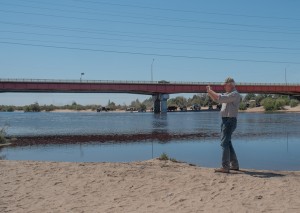
Jack Schmidt, one of the members of the new Colorado River Research Group, at the normally dry San Luis bridge in the Colorado River Delta, March 28, 2014
A new collaboration among some of the serious names in Colorado River Basin water science and policy today launched a new project, the Colorado River Research Group. If you follow Colorado River issues and western water science policy, it’s a list of names (pdf) you’ll be familiar with and, more importantly, that you’ll want to listen to: Robert Adler, Bonnie Colby, Jonathan Overpeck, Karl Flessa, Doug Kenney, Dennis Lettenmaier, Larry MacDonnell, Jack Schmidt, Brad Udall and Reagan Waskom. Importantly, this is not just physical scientists, but also social scientists. (I love y’all, physical scientists, but I’m convinced that the real action right now is on the law and policy side.)
Here’s how they describe themselves:
The Colorado River Research Group (CRRG) is a self-directed team of veteran Colorado River scholars assembled to provide a non-partisan, academic voice on matters pertaining to science, law and policy on the Colorado River, helping all those with a stake in the river identify, justify and implement actions consistent with long-term sustainable management. The CRRG provides an independent and knowledgeable voice that is insulated from political constraints, sectoral alliances, and other pressures that might impede the full consideration of relevant ideas and viewpoints.
Their initial white paper (actually, kinda khaki? – here’s the pdf, color descriptions welcome) outlines some key policy principles:
- “The solutions that are most cost-effective, reliable, equitable, and quickly implemented are those focused on conservation, reallocation, and voluntary shortage sharing.” Augmentation? Not so much.
- Solutions for shifting water use patterns have to be supported by incentives, something we really have’t done to date. They make this interesting point: “The historic failure to manage water with respect to sound economic principles is not merely a problem to lament, but is an opportunity to exploit moving forward. Innovative mechanisms for trading water, money and shortage risk can protect regional economies and can help remove the historic view of water as a zero-sum game.”
- Solutions have to be “flexible and iterative”. Adaptive management and resilience and stuff.
- “Everyone who has received benefits from the river has a responsibility to support solutions through conservation, funding and other suitable mechanisms. No water user should expect a ‘free pass’ in implementing management reforms.” (If I had a dollar for every basin water manager who pointed to the great stuff his or her agency has already been doing by way of the ‘free pass’ thing for future management decisions, I’d have some dollars.)
- And a bottom line: “Without a significant infusion of new funding, lasting and sustainable solutions will not be achieved. To date, the amount of money invested to protect and restore the river is woefully inadequate, and is dwarfed by the resources spent to facilitate overconsumption.” Amen.
updated to include Jonathan Overpeck in list of participants
